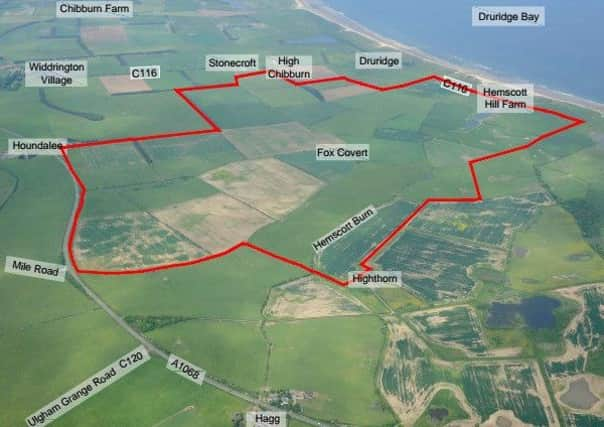Highthorn: Jobs, tourism, coal and climate change among final arguments


The 14th day of the planning inquiry, at Kingston Park in Newcastle, for The Banks Group’s proposed surface mine near Widdrington and Druridge Bay, heard closing submissions from the applicants and Northumberland County Council, as well as opponents Friends of the Earth and the Save Druridge campaign group.
The next steps will see the planning inspector make a recommendation to the Secretary of State, who will make the final decision, although this is not expected until the autumn.
Advertisement
Hide AdAdvertisement
Hide AdSpeaking first, Paul Brown QC, for Friends of the Earth, said that one of Banks’ justifications for its proposal was the need for coal, but ‘today there’s none, demand for coal in the UK has fallen off a cliff’.
“There’s no longer any need for Highthorn coal,” he said, later adding: “There’s no risk that the lights will go out if this application is refused.”
Referring to the local planning policies which suggested that opencast mining should not take place in this area, he said that ‘none of the arguments advanced by Banks or the county council are reasons to give less weight’ to them.
Unsurprisingly, Mr Brown also focused heavily on the Government’s climate-change agenda, saying that assessment of the scheme’s environmental acceptability must include consideration of downstream effects on government policy. “We know that it’s absolutely essential to move to a low-carbon economy as quickly as possible,” he said.
Advertisement
Hide AdAdvertisement
Hide AdHe also touched upon jobs in the light of the shift away from coal, saying: “We don’t assist those in the industry by encouraging them to delay their transition out of the industry.”
In summing up, he said: “It’s the inevitable conclusion of the Government’s policy that there comes a time when we say it’s time to end the extraction of coal and, in Friends of the Earth’s submission, that time is now.”
Many of his arguments were backed by Dr Paul Stookes, representing Save Druridge, who chose to focus on conserving and enhancing the environment, impact on tourism and recreation, and impact on the local economy.
On the first aspect, he discussed issues including noise, dust and light pollution, visual amenity, ecology, hydrology and the loss of agricultural land, while on tourism, he referred to the reported impacts already being experienced by two businesses – the Drift Café at Cresswell and Ellington Caravan Park. “The likely levels of income to the local tourist economy could be seriously undermined by opencast operations,” he added.
Advertisement
Hide AdAdvertisement
Hide AdDr Stookes also said that any economic benefits put forward by Banks were subject to whether the operations continued to be commercially viable and therefore should be given little weight, adding that the number of jobs which could be created as tourism businesses in the area continue to grow would dwarf those provided by Highthorn.
Juan Lopez, on behalf of Northumberland County Council, which approved the scheme in July last year before it was called in, said that the council had carefully assessed the application and was supporting the proposals.
Addressing planning policy in some detail, he concluded that there were ‘a mere few limited and wholly inconsequential conflicts with the development plan’.
In terms of landscape, looking in the medium and long term and including the restored landscape and enhancement measures, there will be beneficial results, he said. The ecological enhancements will be ‘nothing less than transformative’, not least because it will ‘fulfil goals for nature conservation groups’.
Advertisement
Hide AdAdvertisement
Hide AdOn the issue of climate change, Mr Lopez said that while the direction of travel was away from coal, ‘a key contingent remains security of supply’ and ‘the Government has yet to reach a point where it has enunciated the end for coal’.
On the impact on tourism, he added: “Having listened to those concerns, the council considers them to be unfounded.”
Finally, Nathalie Lieven QC, for Banks, which has ‘an excellent track record’, made a detailed response to all of the matters raised at the inquiry.
She too dismissed the out-of-date local planning policies to which the objectors sought to attach importance.
Advertisement
Hide AdAdvertisement
Hide AdOn coal and climate change, she pointed out that the Government’s policies make no link between the phase-out of coal and an end to surface mining, adding that a number of opponents had simply talked about what policy should be, while the Highthorn application has to be decided on current policy.
Ms Lieven said that coal ‘continues to play an important and critical role in UK energy market’ which ‘relies on a consistent and cost-effective energy supply all year round’.
“Impacts on tourism are very difficult to predict,” she said. “Discover Druridge (a partnership project to develop tourism) could lead to really significant improvements for visitors coming to the area.”
She added that the 50 new jobs and the ability to retain 50 jobs are a key benefit and that is by no means the entirety of the economic benefits.